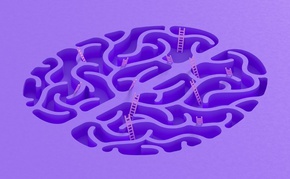The views expressed in our content reflect individual perspectives and do not represent the authoritative views of the Baha'i Faith.
My understanding of oneness has evolved over decades of daily interaction with my family: a family made up of differing ethnicities and cultures, united by a devotion to love and kindness.
My wife and I recently returned from our son’s wedding in New York. Though the events were small for safety reasons, it created an opportunity for a vastly diverse family to come together in love and unity, to celebrate the union of an African American man and a Persian woman. This overjoyed assemblage included parents, brothers, sisters, and friends from Black, White, Persian, and Hispanic cultures. It was a celebration of differences, highlighted by a blending of cultures through food, dress, music, dance, and perspectives.
I realized that this kind of joy does not have to be an occasional event. It can be the way we live all the time — experiencing the tests and trials of life together as one family, without overlooking the wrongs in the world that must be corrected to create truly loving and just communities.
RELATED: 3 Spiritual Steps to Building – and Keeping – Family Unity
The Baha’i teachings explain that human beings can go beyond simply living and working together justly and harmoniously: we can build a society free of conflict and confrontation on every level. This idea of oneness has circulated in human thought and hearts for over a century, taking shape through the formation of new models of organization, learning, and action — and today, it is more possible than ever.
Social movements claim that power concedes nothing unless demanded. The Baha’i movement, however, is spiritual in nature. Its writings say that true and lasting justice will never be achieved through social or educational movements alone: rather, it will be achieved through a transformation of human hearts, and this can only happen through spiritual means.
Baha’u’llah, the prophet and founder of the Baha’i Faith, explained the importance of recognizing our oneness as brothers and sisters in the human family. Nothing of lasting value can be achieved in the world otherwise. He wrote:
O Children of Men! Know ye not why we created you all from the same dust? That no one should exalt himself over the other. Ponder at all times in your hearts how you were created. Since we have created you all from one same substance it is incumbent on you to be even as one soul, to walk with the same feet, eat with the same mouth and dwell in the same land, that from your inmost being, by your deeds and actions, the signs of oneness and the essence of detachment may be made manifest.
This radical notion of oneness, Baha’u’llah wrote, is the prerequisite for realizing social and racial justice:
The well-being of mankind, its peace and security are unattainable unless and until its unity is firmly established … Ye are the fruits of one tree, and the leaves of one branch. Deal ye one with another with the utmost love and harmony, with friendliness and fellowship. He Who is the Day Star of Truth beareth Me witness! So powerful is the light of unity that it can illuminate the whole earth.
Recognizing our essential oneness, however, is only the beginning. Recognition must go hand in hand with constant effort to heal the wounds of injustice that have been heaped on large swaths of the human family throughout history. The false doctrines of racism, sexism, materialism, and classism must be recognized for what they are: toxic realities that have deeply traumatized every member of the human family, especially our Black and brown brothers and sisters.
These ills are symptoms of disunity: a failure to understand and apply the essential oneness of the human family. True and lasting justice in the world will only be achieved through a universal commitment to oneness.
The Baha’i teachings recognize this social and spiritual illness as the most vital and challenging issue the American community must overcome in the process of establishing a truly unified society.
Imagine ten carpenters trying to build a house with ten different sets of blueprints while the wood is being eaten away by termites. Once the carpenters agree on a single set of blueprints, they can make rapid progress on building the house and work together to eliminate the termites.
RELATED: How You Can Build Global Unity From the Grassroots Up
Had unity existed among the carpenters in the beginning, they would have paid close attention to the well-being of the house, and would not have allowed the termites to multiply and gain strength. If, however, the carpenters had recognized the danger presented by the termites and tried to defeat them only in this corner or that corner, while stubbornly trying to build a house according to their own blueprints and working against each other, the termites would have continued to eat away at the house and would have eventually destroyed it.
Abdu’l-Baha, Baha’u’llah’s son and successor, shared clear and succinct instructions as to how to carry out this monumental task of remaking the world so that pain can be transformed into harmony and justice:
You must manifest complete love and affection toward all mankind. Do not exalt yourselves above others, but consider all as your equals, recognizing them as the servants of one God. Know that God is compassionate toward all; therefore, love all from the depths of your hearts, prefer all religionists before yourselves, be filled with love for every race, and be kind toward the people of all nationalities. Never speak disparagingly of others, but praise without distinction. Pollute not your tongues by speaking evil of another. Recognize your enemies as friends, and consider those who wish you evil as the wishers of good. You must not see evil as evil and then compromise with your opinion, for to treat in a smooth, kindly way one whom you consider evil or an enemy is hypocrisy, and this is not allowable. You must consider your enemies as your friends, look upon your evil-wishers as your well-wishers and treat them accordingly. Act in such a way that your heart may be free from hatred. Let not your heart be offended with anyone. If some one commits an error and wrong toward you, you must instantly forgive him. Do not complain of others. Refrain from reprimanding them, and if you wish to give admonition or advice, let it be offered in such a way that it will not burden the bearer. Turn your thoughts toward bringing joy to hearts. Beware! Beware! Lest ye offend any heart. Assist the world of humanity as much as possible. Be the source of consolation to every sad one, assist every weak one, be helpful to every indigent one, care for every sick one, be the cause of glorification to every lowly one, and shelter those who are overshadowed by fear.
Baha’u’llah gave us the means, for the first time in history, to heal the wounds human beings have inflicted on one another, and to establish true and lasting justice in the world.

















Comments
Sign in or create an account
Continue with Facebookor